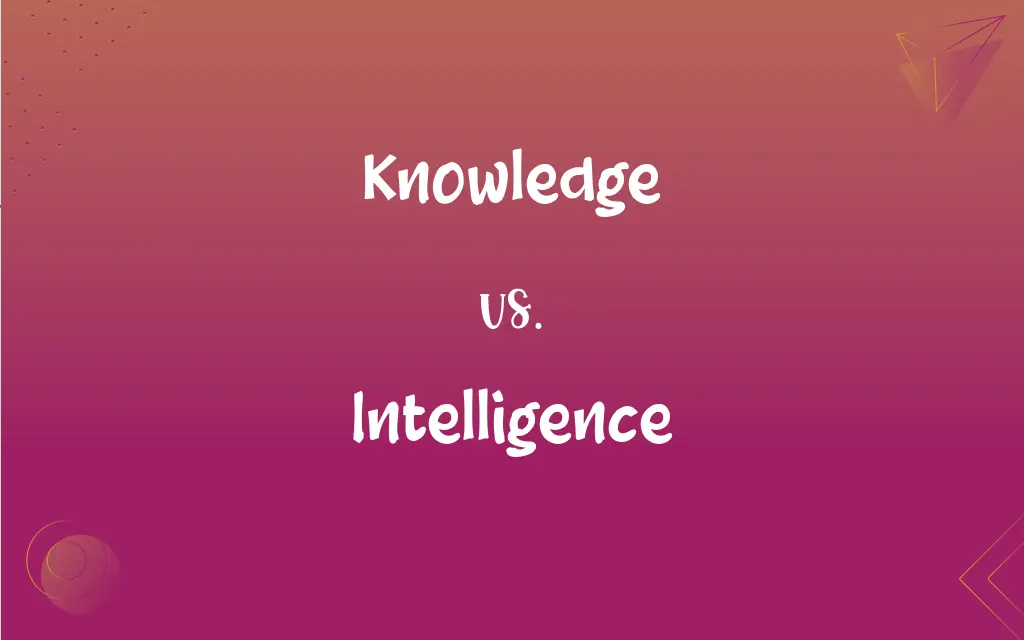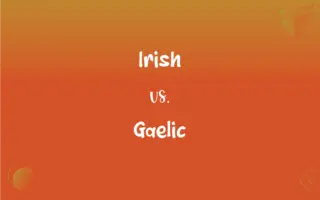Knowledge vs. Intelligence: What's the Difference?
Edited by Aimie Carlson || By Harlon Moss || Updated on July 30, 2024
Knowledge refers to acquired information and skills, while intelligence pertains to the ability to learn, understand, and apply information.

Key Differences
Knowledge represents the accumulation of facts, information, and skills attained through experience and education. On the other hand, intelligence often denotes the capacity to acquire, understand, and apply knowledge, as well as to engage in abstract thinking and problem-solving.
Knowledge is often considered tangible, as it is quantifiable and can be tested, such as through exams or certifications. In contrast, intelligence tends to be more intangible and encompasses one's ability to process information, solve problems, think abstractly, and comprehend complex ideas.
The acquisition of knowledge can be an ongoing lifelong process, resulting from learning and experience. Conversely, intelligence is typically considered an inherent ability, and while it may be developed to a degree, it is often regarded as a trait with which one is born.
Knowledge typically pertains to specific information about particular subjects and is often domain-dependent. In contrast, intelligence is generally considered domain-independent, representing a general ability to acquire and apply knowledge across various domains.
While knowledge and intelligence are distinctly different, they often interplay; knowledge supports intelligent decision-making, while intelligence facilitates the efficient acquisition and application of knowledge.
ADVERTISEMENT
Comparison Chart
Definition
Information, facts, skills acquired via experience
Ability to learn, understand, and apply knowledge
Tangibility
Tangible and can be measured
Less tangible, harder to quantify
Development
Acquired and built over time
Generally considered inherent to some degree
Domain Dependency
Often domain-dependent
Usually domain-independent
Application
Applied based on learning and experience
Applied to learn and solve problems efficiently
ADVERTISEMENT
Knowledge and Intelligence Definitions
Knowledge
Skills attained through experience.
Her knowledge of carpentry was learned from her father.
Intelligence
The collection of information of military or political value.
The spy provided intelligence on enemy movements.
Knowledge
Awareness or familiarity gained by experience of a fact or situation.
He denied all knowledge of the incident.
Intelligence
The ability to acquire and apply knowledge and skills.
Her intelligence was evident through quick problem-solving.
Knowledge
Information held on a particular subject or field.
His knowledge of science greatly contributed to the discussion.
Intelligence
Capacity for learning, reasoning, understanding, and analogous forms of mental activity.
The test aimed to measure the students' intelligence.
Knowledge
Acquired information and facts.
His knowledge of history is quite impressive.
Intelligence
The ability to comprehend; to understand and profit from experience.
His emotional intelligence enables him to work well with others.
Knowledge
The theoretical or practical understanding of a subject.
She has a thorough knowledge of the subject matter.
Intelligence
Mental acuity or agility.
His intelligence allowed him to learn multiple languages with ease.
Knowledge
The state or fact of knowing
Humans naturally aspire to knowledge.
Intelligence
The ability to acquire, understand, and use knowledge
A person of extraordinary intelligence.
Knowledge
Familiarity, awareness, or understanding gained through experience or study
Has great knowledge of these parts.
Has only limited knowledge of chemistry.
Intelligence
Information, especially secret information gathered about an actual or potential enemy or adversary.
FAQs
Can one have knowledge without intelligence?
Yes, one can have knowledge (information or skills acquired through experience) without a high level of general intelligence.
Can one have intelligence without knowledge?
Yes, one can possess the ability to learn (intelligence) without yet having acquired significant knowledge.
How is knowledge acquired?
Knowledge is typically acquired through learning, experience, and study.
Can intelligence be developed?
While there's debate, many believe intelligence can be developed to some extent through stimulating activities and learning.
Is knowledge always factual?
Not necessarily; knowledge can encompass both factual information and skills developed through experience.
What is the role of intelligence in learning?
Intelligence plays a crucial role in learning by affecting how efficiently and effectively an individual can acquire, retain, and apply new information.
Can knowledge and intelligence be improved in adults?
Knowledge can continuously be expanded at any age, while intelligence can potentially be improved or maintained through cognitive exercises and challenges.
Are there different types of intelligence?
Yes, theories such as Gardner's Theory of Multiple Intelligences suggest various forms, like linguistic, logical-mathematical, and emotional intelligence, among others.
Can an individual’s knowledge and intelligence be entirely separated?
While distinctly different, knowledge and intelligence often interplay and are therefore not entirely separable in practical contexts.
What roles do knowledge and intelligence play in critical thinking?
Knowledge provides the information base, while intelligence enables the application, analysis, and evaluation of that information in critical thinking.
How can knowledge be measured or tested?
Knowledge can be measured through various testing methods, like exams, quizzes, or practical applications of skills.
Is there a relationship between emotional intelligence and knowledge?
Emotional intelligence pertains to understanding and managing emotions, which can influence and be influenced by interpersonal and intrapersonal knowledge.
How can intelligence be measured accurately?
Intelligence is commonly measured using IQ tests, but the accuracy can be influenced by various factors, such as socio-economic background, education, and more.
How does practical knowledge relate to theoretical knowledge and intelligence?
Practical knowledge involves applying theoretical knowledge (information) in real-world scenarios, with intelligence potentially influencing the efficiency and effectiveness of application.
Can one’s level of knowledge impact perceived intelligence?
Yes, extensive knowledge in specific domains might be perceived as intelligence due to informed decision-making and problem-solving within those domains.
Is there a maximum limit to knowledge acquisition?
While there may be limits based on memory and lifespan, theoretically, an individual can continue acquiring knowledge indefinitely.
How can technology impact the acquisition of knowledge and development of intelligence?
Technology can facilitate access to information, aiding knowledge acquisition, and provide cognitive training tools that may potentially enhance aspects of intelligence.
How are knowledge and intelligence valued in different cultures?
Cultural values can influence the emphasis and interpretation of knowledge and intelligence, shaping societal norms and expectations.
How are knowledge and intelligence related to wisdom?
Wisdom often involves applying knowledge judiciously and intelligently in real-life situations, reflecting an intersection of knowledge and intelligence.
Can a lack of knowledge be compensated by high intelligence?
High intelligence might facilitate quicker learning and problem-solving even with limited knowledge, but specific domain knowledge might still be necessary for certain tasks.
About Author
Written by
Harlon MossHarlon is a seasoned quality moderator and accomplished content writer for Difference Wiki. An alumnus of the prestigious University of California, he earned his degree in Computer Science. Leveraging his academic background, Harlon brings a meticulous and informed perspective to his work, ensuring content accuracy and excellence.
Edited by
Aimie CarlsonAimie Carlson, holding a master's degree in English literature, is a fervent English language enthusiast. She lends her writing talents to Difference Wiki, a prominent website that specializes in comparisons, offering readers insightful analyses that both captivate and inform.







































































